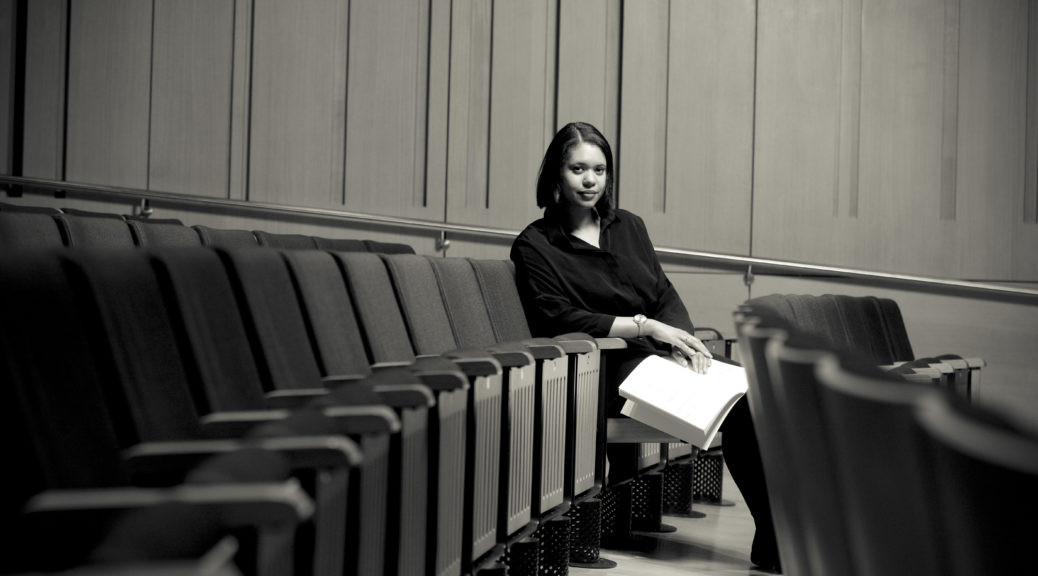
Berkeley Symphony: Equality and Premieres
BERKELEY, CA—The Berkeley Symphony seeks to carve out a role on the forefront on equality and social-justice issues. And it is well on the way. Disregarding the Asian players in the orchestra, this week I counted more players of color (two) in the ensemble than in nearly all the professional orchestras around.
Furthermore, on Jan. 31 all the guest artists were black: Conductor Joseph Young, actor Michael Asberry, and the English composer Hannah Kendall, 34. And Kendall’s world-premiere opus was inspired by the eponymous 1952 novel on equality and prejudice “Invisible Man” by Ralph Ellison (not to be confused with the earlier H.G. Wells book), taking on the weighty matter of racism in America.
Kendall’s new “Disillusioned Dreamer” opus is a soundscape with interspersed readings from the Ellison novel provided by the sonorous bass voice of Asberry. Kendall’s format—reading-stop-music-stop-etc.—is jumpy, as if trying to mix oil and water. (Aaron Copland’s “Lincoln Portrait” used a much more integrated method for narration.) But her music, happy to say, is ingratiating.
She adheres to a bold, contemporary musical language, with restraint more than effusiveness. Her 15-minute work seems to enter a world of uncertainty and fantasy, with many more questions than answers. The music is subdued, punctuated by staccato thrusts and spasmodic statements, using an ever broadening sonic spectrum and an ever more restless orchestra.
Her premiere was placed between two 20th-century staples: Britten’s masterful and gorgeous tone painting “Four Sea Interludes from ‘Peter Grimes’” wherein lovely broken chords suggest swells at sea, and the 36-minute Symphony No. 2 (“Age of Anxiety”) by Leonard Bernstein, marking a century since the latter’s birth.
The 2nd Symphony spotlights Bernstein, that collegiate classics major who became one of the most versatile of all our creative artists given his composing, conducting, piano-playing, enlightened lecturing, and hit-Broadway-show-writing. It’s a hybrid piece, not really a piano concerto (not with Andrew Tyson playing the keyboard, perhaps akin to the brash and 30ish L.B. taking the piano at the world premiere). But given its free form it’s not truly a symphony either, inspired as it was by W.H. Auden’s probing but unquoted poem on existence and faith. Its multiple moods run through repose, quasi-poetic meditations, orchestral broadening, a piano cadenza, jazzy syncopation, and a grandiose finale.
Conductor Young was the “fireman” who saved the day. On the staff at the Peabody Conservatory in Baltimore, the tall and elegant leader flew west and stepped in for podium guest Jonathon Heyward who was taken ill. Like a first-responder, Young arrived just in time to conduct all the BSO rehearsals. Cuing efficiently and showing an altogether professional manner, much to his credit he was able to master the program with no changes—a task far more difficult than that of a scheduled guest conductor. What could have been a near-disaster flowed out as smoothly as one could possibly wish.
And Berkeley’s significant musical statement about identity and relationships became reality despite adverse circumstances.
It’s uncertain whether the indisposed Heyward can be booked for a make-up gig here; quite possibly he might now be out of the running for the vacant music-director’s slot at BSO. His pre-cancelation text about the upcoming concert in the printed program was unusual, using the word “fantastic” four times in four sentences. So, quite possibly, his conducting itself will also be fantastic, if and when.
Berkeley Symphony under guest conductor Joseph Young, in works of Britten, Bernstein and Hannah Kendall (world premiere). Zellerbach Hall, Berkeley, Jan. 31. For BSO info: (510) 841-2800, or go online.